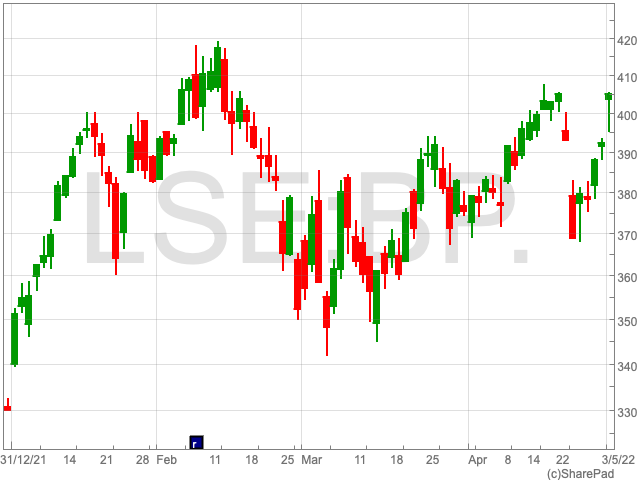BP shares gained 3% to 403p after the company announced a jump in underlying profits from $4.1bn to $6.2bn, despite reporting a loss of $20.4bn in its Q1 results on Tuesday.
BP reported a loss of $20.4bn in its Q1 results compared to profits of $4.7bn in the fourth quarter of 2021, primarily due to the decision of exiting Rosneft shareholdings.
The oil and gas company noted a drop in total revenue to $51.2bn from $52.2bn in Q4 2021, however, net impairment and losses on the sale of businesses and fixed assets increased drastically to $26bn from $1.2bn in the first quarter of 2021.
Net impairment charges for the first quarter of 2022 were $26bn compared to $373m in Q1 2021 and included net impairment charges of $14.4bn for the first quarter of 2022 compared to $220m.
For the first quarter of 2022, there was a net impairment charge of $252m in the gas & low carbon energy division compared to £122m in Q1 2021 for BP.
In the oil production & operations segment, there was a net impairment charge of $624m compared to $99m in the first quarter of 2022.
BP’s decision to quit additional ventures with Rosneft within Russia resulted in impairment charges in the first quarter of 2022. Impairment reversals related to producing assets due to reserve additions counterbalance them.
In the other businesses and corporation segment, a net impairment charge of $13.5bn was recorded in the first quarter of 2022 reversing a $3m charge in 2021 and a loss on sale of businesses and fixed assets of $11.1bn.
The group swung to a pretax loss of $16.9bn from a pretax profit of $4.8bn in Q4 2021, however, underlying RC profit increased to $6.2bn from $4.1bn.
BP’s loss attributable to shareholders amounted to $20.4bn primarily due to the decision to exit Rosneft shareholding and the group’s EPS decreased to $104.
For the first quarter, BP announced a dividend of 5.46 cents per ordinary share payable in June 2022.
In the first quarter, BP received $1.2bn in divestment and other proceeds, and it expects to receive total proceeds of $2-3bn in 2022.
In the first quarter of 2021, total divestment and other proceeds were $1.2bn, compared to $4.8bn in 2021 which comprised proceeds from the sale of BP’s Swiss retail operations, the sale of BP’s investment in the Pike oil sands assets, and the receipt of deferred consideration relating to BP’s Alaska business divestiture to Hilcorp in 2020. The sale of a loan note related to the Alaska divestment resulted in $0.2bn in other proceeds in the first quarter.
BP completed $1.6bn in share buybacks in the first quarter, including $0.5bn in January to offset the expected full-year dilution of 2022 vesting of awards under employee share schemes, and $1.1bn in February to progress toward the $1.5bn programmes announced with the fourth quarter 2021 results on February 8. On April 27th, the programme was completed.
BP earned $4.1bn in surplus cash flow in the first quarter and plans to buy back $2.5bn in shares before reporting its second-quarter results.
BP noted a reduction in net debt to $27.5bn at the end of the first quarter and announced a further buyback of $2.5bn shares.
Since the beginning of 2022, BP has announced the start-up of the Herschel Expansion major project in the Gulf of Mexico, signed a final agreement with Eni to form Azule Energy, a new independent joint venture in Angola, and advanced its biofuels strategy by producing sustainable aviation fuel at BP’s Lingen refinery and entering into a long-term strategic offtake and market development agreement with Nuseed.
BP has also continued to advance its electric vehicle charging strategy, launching a strategic partnership with Volkswagen Group and announcing plans to invest £1bn in the UK over the next decade; signed a global strategic convenience partnership with Uber, aiming to make more than 3,000 retail locations available on Uber Eats by 2025; and signed a strategic collaboration agreement with DHL Express to supply sustainable aviation fuel.
Since the beginning of 2022, BP has increased its position in offshore wind with the ScotWind lease option award of 1.45GW net, agreed to form an offshore wind partnership with Marubeni, and advanced its hydrogen strategy by announcing plans to develop H2-Fifty, a 250MW gross green hydrogen plant in Rotterdam, and signing an agreement to form a joint venture with Aberdeen City Council to develop a hydrogen hub.
The shift to an Integrated Energy Company is progressing.
BP exits Rosneft
The first-quarter impairment charge and loss on sale of enterprises and fixed assets are mostly related to bp’s investment in Rosneft as BP exited its 19.75% shareholding in the company.
The loss of considerable control over Rosneft, combined with market effects on Russian assets, resulted in a $13.5bn impairment charge, of which $528m relates to projected earnings in the quarter previous to the loss of major influence.
In addition, $10.4bn in accumulated exchange losses, $651m in a cash flow hedge reserve related to the original acquisition of Rosneft shares, and $59m in BP’s cumulative share of Rosneft’s other comprehensive income were reclassified to the income statement in the quarter for a total of $11.1bn.
From February 27, 2022, BP no longer recognised a share of Rosneft’s net income, output, or reserves due to the change in accounting method.
BP also opted to withdraw its other activities with Rosneft in Russia, which are included in the oil production & operations section.
The fair value of these firms has similarly been assessed to be zero. This decision resulted in a $1bn impairment charge, including $35m in expected earnings for the quarter and $479m in accumulated exchange losses previously charged to equity and transferred to the income statement.
The total pre-tax charge for bp’s investment in Rosneft and other enterprises with Rosneft in Russia in the first quarter of 2022 is $25.5bn.



“BP’s first-quarter results will do nothing to quell talk of a windfall tax on oil and gas companies,” says Russ Mould, Investment Director, AJ Bell.
“The oil giant might have hoped attention would focus on an apparent $20.4 billion loss – created by impairments linked to its exit of interests in Russia – but the strongest underlying profit in a decade of $6.25 billion was more revealing of the impact of surging oil and gas prices on the business.”
“The exit from Russia, while bringing with it considerable costs, arguably helps with the transformation of the group and strong cash flow is helping to bring down debt.
“BP has ambitious plans to become cleaner and greener but today’s update is a reminder that fossil fuels, with all the environmental and geopolitical mess they entail, remain central to the company for now.”





